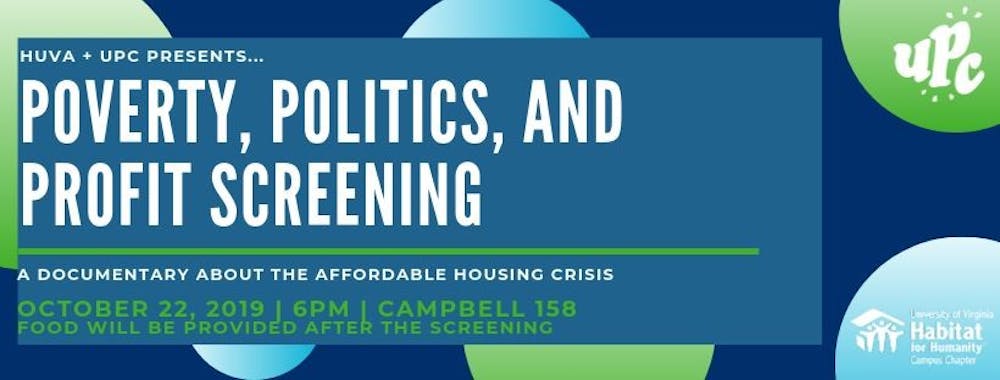The University’s Habitat for Humanity Club put on a screening of the Frontline documentary “Poverty, Politics and Profit” Tuesday evening in Campbell Hall. Around 30 students and community members came to watch the documentary, which addresses issues regarding Section 8 housing vouchers in the United States and other programs intended to help solve the affordable housing crisis that is currently facing the nation.
Taylor Thompson, third-year Architecture student and president of the University’s Habitat for Humanity Club, shared why an organization that has historically been focused on homeownership thought it was important to screen a documentary focused on renters’ issues.
“I think the important thing … is just that it's not specifically about homeownership,” Thompson said. “Homeownership isn't going to work for everybody. Tt's the entire ladder of housing as a whole that'll really mean to us kind of getting out of this affordable housing crisis.”
The documentary almost immediately touched on the issue of homeownership and its relationship to the 2008 financial crash, which led many people to rent houses due to forced foreclosures and reductions in income.
The goal of the screening was to bring the affordable housing crisis to students’ attention so that they can be more engaged and informed in the future.
Before the screening, Thompson shared that the Habitat for Humanity Club saw itself as a dynamic club with many roles, including “to educate and advocate so that when students leave the University and start to enter into their own professional kind of careers, they have this underlying education and knowledge that they can start to make a difference within their professional lives as well as a person.”
After the documentary ended, the floor was opened up to a community discussion and the focus immediately shifted to affordable housing issues in Charlottesville, a topic that Habitat for Humanity is heavily involved in.
The dynamics behind the location and funding of local building projects like the Southwood mobile home park that's just south of Charlottesville, and the Friendship Court apartments near the mall, dominated much of the conversation, both of which are experiencing ongoing redevelopment efforts. While the documentary explored how there have been cases of strong community resistance to the placement of affordable housing, the local projects faced no such resistance.
However, much of the resistance in the film stemmed from placing projects in high-income areas, which isn’t the case for the local projects.
Local real estate broker Tom Raney said “Friendship Court and Southwood are relocating in existing places. They’re not going into new places.”
Marlena Becker, a third-year Batten student and education and advocacy chair of Habitat, stressed the importance of taking many different approaches and finding the best mix to fit local situations.
“There won’t be just one solution when you can [have] the combined efforts of different perspectives,” Becker said. “That's one way to make sure you're getting the right combination.”
Another topic of discussion centered around University students’ effect on local housing prices. Housing prices are rising rapidly in Charlottesville, a trend that has been partially attributed to students who choose to live off-Grounds after their first year at the University.
Michael Swanberg, an associate professor of nursing at the University who attended the event, described how some of his students who work at The Haven, a local homelessness shelter, react upon finding out they contribute to the problem.
“[They’re] shocked to hear from people who are temporarily experiencing homelessness that they’re often implicated,” he said.
In February, University President Jim Ryan’s community working group — commissioned to strengthen historically strained ties between the Charlottesville community and the University by identifying the area’s most pressing issues — released a report naming affordable workforce housing as one of its top priorities for the University to address in coming years. Jobs and wages were named the top priority issue for the University.
According to Becker, Habitat for Humanity at the University looks to continue its education and advocacy on the affordable housing crisis to encourage broader engagement in the future.







